Prime Minister Mateusz Morawiecki taking part in the celebrations of the 79th anniversary of the outbreak of World War II © Wikicommons
Nobody could accuse Mateusz Jakub Morawiecki of cowardice. He used to distribute copies of Solidarność’s magazines after martial law was declared by Poland’s Communist rulers in 1981, working bravely against Poland’s government from the age of 12. He began by copying out anti-Communist literature for the underground movement. In August 1980, it’s claimed, he plastered walls in Wrocław, his home city, with posters encouraging a general strike. In the 1980s he even edited a banned anti-Communist magazine and he once claimed in an interview to have thrown petrol bombs at police cars, the very sort of violent protest he condemns today. It’s ironic, in a way, that such weapons are commonly known as “Molotov cocktails”, since it was the Soviet Union Foreign Minister Vyacheslav Molotov’s underhand deal with his Nazi German equivalent, Joachim von Ribbentrop, that led to Poland being divided up in an unholy alliance between Joseph Stalin and Adolf Hitler. Morawiecki also says that during his time as a political activist he was stopped and beaten up by Communist security officers on several occasions, which cannot have come as a surprise. But he persevered, proving his courage, his commitment and his dislike of Communism.
Nobody could accuse Morawiecki of not being a clever and highly educated man, either. Born in Wrocław in 1968, he went to the University of Wrocław, continuing his tertiary education at the Universities of Hamburg and Basel, where he attained degrees in arts, business administration and advanced studies while incidentally learning both German and English along the way. He lectured at Wrocław University of Economics for eight years, two of them also spent at the Wrocław University of Technology. His first job outside academia was with Cogito Co., a company in Zabrze, Poland, that supplied spare parts for earth-moving machines. From 1993 to 1996 he worked in the publishing industry, principally with ENTER Marketing-Publishing in Wrocław. In 1995 he became an intern at the Deutsche Bundesbank and in 1996–97 he held a position at Goethe University in Frankfurt am Main.
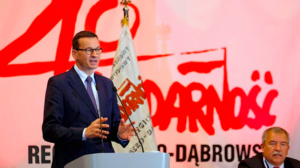
In 1998, his economics qualifications and experience earned him a position at the commercial Bank Zachodni WBK, a Polish bank that was part of the Spanish Banco Santander Group, where he became managing director and subsequently chairman. Despite recent conflict with the EU over his country’s laws and practices, he was deeply involved in the negotiations for EU membership, to which he still says he is committed. As deputy director of the Accession Negotiations Department in the Committee for European Integration, he was involved in several areas of negotiations for membership, especially – perhaps inevitably – finance and economics. As the world knows, Poland was one of the nations to take part in what was known as ‘the Big Bang enlargement’, when ten countries joined the European Union at the same time.
The celebrations surrounding that event were huge and, for the EU, somewhat self-congratulatory, although there were voices of doubt, too, even as the accession documents were signed at a ceremony in Athens in 2003. It seemed more like a big party for those of us who were there. Could this massive enlargement of the Union harm it by diluting its principles? Were the Eastern European countries really ready? Some certainly were, others perhaps less so. Whatever his doubts about various EU rules and the overall direction of travel, Morawiecki has not expressed a wish to leave the Union. Indeed, in 2019 he told the BBC that Britain’s decision to leave had seen a large number of Poles returning home from a UK apparently determined to become increasingly isolated. He hoped that trend that would continue, he said, so as to ‘boost the Polish economy’. As for his political career, from 1998 to 2001 he was a member of the supervisory boards of the Industrial Development Agency and the Electricity Board in Wrocław. He also tried his hand at electoral politics and served as a councillor in the Lower Silesia Regional Assembly.

FROM ONE PARTY TO ANOTHER
However, Morawiecki did not immediately join a political party and in 2010 went on to become political advisor to Donald Tusk of the liberal Civic Platform (PO) party. Tusk could spot a clever man when he encountered one. Morawiecki was elected to parliament in the sweeping political change of 2015, when the Law and Justice party (PiS), the main political opposition to PO, won a massive electoral victory. He was appointed Minister of Economic Development. His views were seen as relatively moderate by comparison with those of the PiS leadership (and others in the party) and it’s thought he was chosen largely to reassure international investors, some of whom feared the neo-nationalist outlook of PiS leaders. The party wanted to “Polandise” the economy, potentially putting inward investment in jeopardy. Morawiecki was familiar with international economics and trade and took up his new post with a strong commitment to deregulation, private entrepreneurship, and the development of smart technologies. He was successful and the Polish economy thrived, growing by 4% per year under his care; his economist’s instincts were still sound. However, the government of Prime Minister Beata Szydło came in for criticism when it attempted to impose controversial judicial reforms by sacking or retiring judges who didn’t share the party’s views. Jarosław Kaczyński, the de-facto leader of PiS and former Prime Minister orchestrated a cabinet reshuffle that saw Morawiecki promoted to Deputy Prime Minister, while also continuing as Finance Minister and Minister of Development. He had a lot on his plate, but greater honour was to follow: Kaczyński thought that Morawiecki had more voter-appeal than Szydło, so he was given the top job, replacing her, although she remained as his deputy. She now sits in the European Parliament. Morawiecki found himself having to defend the judicial changes that had caused such outrage in Brussels and also to defend Poland against being forced to accept a share of the migrants flooding into Europe to escape war zones, extreme poverty and hunger.
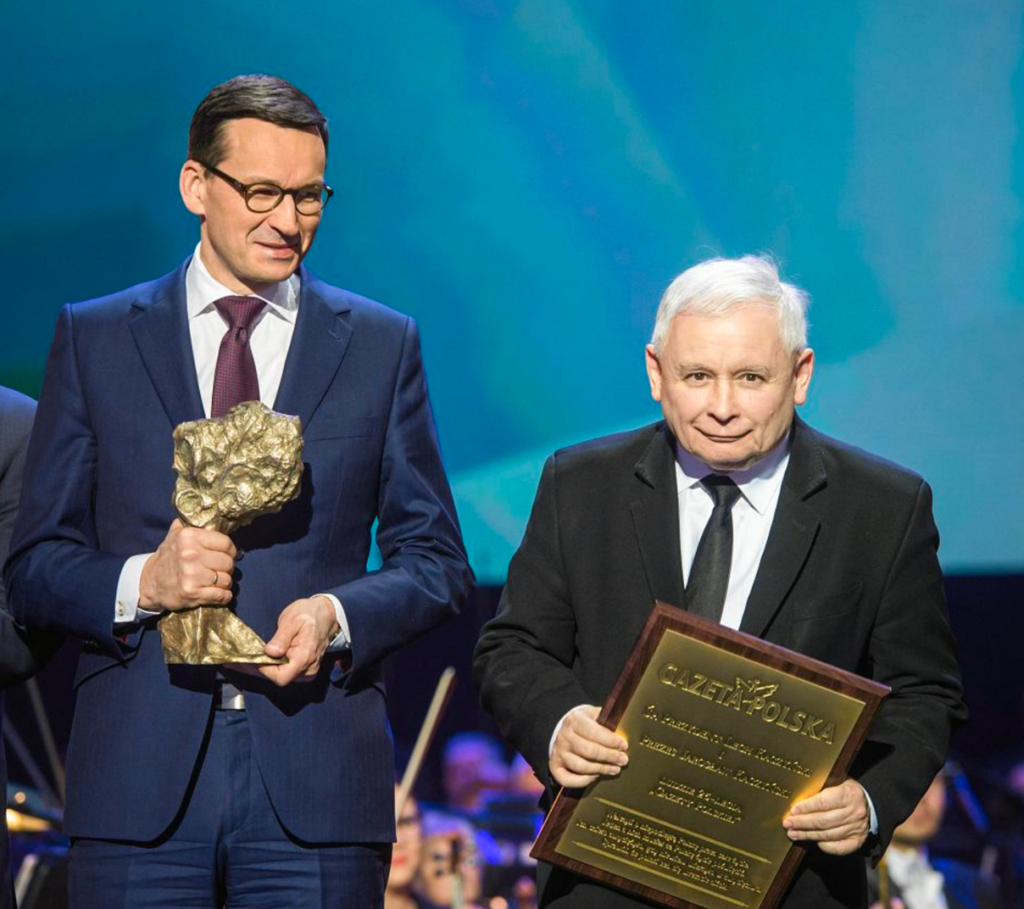
At the moment, like other world leaders, Morawiecki’s main concern is COVID-19 and the need to protect his people from something more immediately deadly than alleged moral turpitude. He recently Tweeted: “I spoke to CEO @pfizer Poland, D. Hryniewiecka-Firlej. We agreed the rules of vaccine distribution with the President of the European Commission. We want the vaccine to reach us as soon as possible. This is a chance to return to NORMALITY” (his use of capitals). Wishful thinking that may be, but it is something shared with leaders worldwide. In another Tweet on the same day he wrote “Today there was a message of hope in the media – @pfizer and @BioNTech_Group announced that the vaccine they prepared was more than 90% effective. It doesn’t mean she’s ready yet, but we’re closer than ever. I am appealing – let us protect ourselves and others.” Morawiecki went into self-isolation after coming into contact with a confirmed case but continued to work from home. In a video message posted on Facebook later, he said: “From today on I will be working remotely. Look after yourselves and be responsible. I am wishing good health to everyone! The government continues to work normally and I am in constant touch with all government officials and departments.” So far, the SARS-CoV-2 virus has proved itself very tricky, able to adapt and mutate, which is why the Pfizer–BioNTech vaccine relies on promoting T-cells, rather than antibodies.

Research has shown that antibodies to the SARS-CoV-2 virus don’t remain in the body for very long, just like the antibodies for the coronavirus that causes the common cold (that’s why colds keep coming back and never provide immunity), whereas T-cells, which attack cells infected with the COVID-19 virus and so prevent it from reproducing, seem to last much longer. It may be too early to break out the champagne but perhaps a glass of ordinary wine might be justified.
Morawiecki’s distrust of Russia is not limited to his dislike of Communism. Moscow may not have a Politburo anymore but Morawiecki seems sure that the changes are more cosmetic than real. He’s clearly not afraid to speak out against the current occupant of the Kremlin. Take , for instance, the attack on Russian opposition leader Alexei Navalny. Morawiecki denounced Russia as a “hostile regime” after Germany revealed that Navalny had been poisoned. He listed the many accusations against Vladimir Putin in a Tweet: “Georgia 2008. Crimea and Donbas since 2014. MH17 (the Dutch passenger jet brought down over Eastern Ukraine by a Russian Buk missile). Salisbury 2018. Berlin 2019. Navalny 2020. How many wake-up calls do we need to finally realise that we are dealing with a hostile regime?”
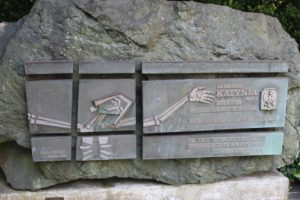
Needless to say, Putin denies involvement. It’s not just the incidents flagged up by Morawiecki either, that fuel the tension between Warsaw and Moscow. Most Poles still remember how their then President, Lech Kaczynski and ninety-four other Polish dignitaries died when the Polish Air Force Tu-54 ‘plane in which they were travelling crashed while coming in to land in dense fog at Smolensk in 2010. Many still suspect Russian involvement because those on board were on their way to commemorate the 1940 murders of 22,000 Polish troops and senior officials in the Katyn forest, at the hands of Russia’s NLVD (which later became the KGB and is now the FSB). The deadly crash is suspicious. It may have been a coincidence. There again, knowing Putin, it may not.
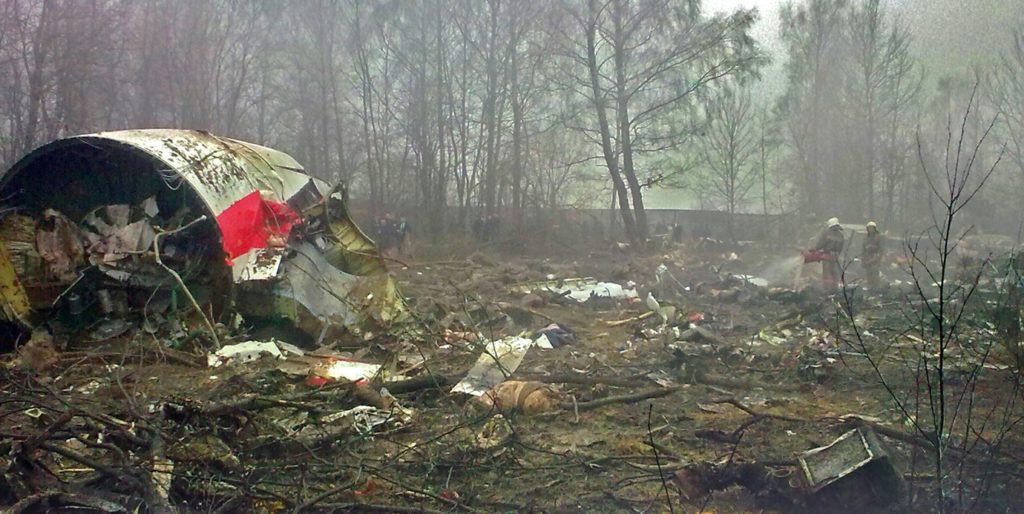
A STRONG WARNING
Morawiecki has also warned Moscow not to intervene in the crisis in neighbouring Belarus, where the Belarusian people have been displaying their anger against Putin’s ally, Alexander Lukashenko, who claimed to have won a fairly obviously fraudulent election. Putin may not need to intervene, in fact: Lukashenko’s government has ordered Belarusian banks to freeze the assets of protestors to prevent them from funding further unrest or even paying their fines. Putin should note – and Morawiecki will probably cheer – the comments of US President Elect Joe Biden, even before his election victory: “Although President Trump refuses to speak out on their behalf, I continue to stand with the people of Belarus and support their democratic aspirations,” he said. Morawiecki had already warned that Russia seems to be reviving what was called “the Brezhnev Doctrine”, a policy from the Soviet era that entitled Russia (at least in the minds of Kremlin officials) to intervene in countries where people rose up against Soviet rule.
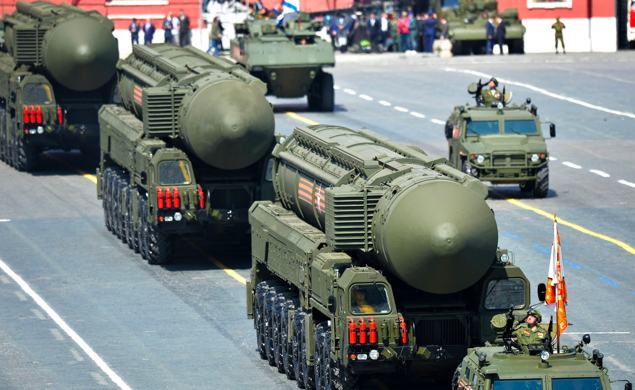
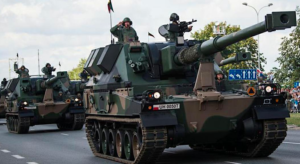
It’s what led to the disastrous invasion of Afghanistan, a country so riven with small internal conflicts among the various tribes and clans that no outside invader ever stood a chance of remaining in power for long, as history clearly demonstrates. Most of the male population – especially away from the larger towns and cities – seem to carry guns, which they’re happy to turn on foreigners. Tamim Ansary, in his informative and entertaining book about the history of Afghanistan, ‘Games Without Rules’, has a simple explanation for the tribes’ militaristic attitude: “Afghans use a pithy phrase to sum up why men fight wars: zar, zan, u zameen. ‘Gold, women, and land.’ That’s exactly what these foreigners seemed to be after, at least to the villagers they were ‘educating’.”
Morawiecki’s clear distaste for Putin was demonstrated again in 2018 when he – understandably – reacted angrily to Putin’s claim that Poland shares responsibility for World War II. That’s a bit rich, coming from the leader of a country that had agreed to carve up Poland under the Molotov-von Ribbentrop Pact into the respective spheres of influence of Soviet Russia and Nazi Germany. It was a disgraceful agreement, although some have argued that it bought an unprepared Soviet Union time to find ways to resist Hitler’s blitzkrieg. The pact was finally repudiated by Josef Stalin in 1940, when he rejected Hitler’s offer of a ‘junior partnership’ in the German-Italian-Japanese Axis. That rejection, according to the memoirs of Soviet General Georgy Zhukov, reduced Molotov to tears; he realised he’d been played for a sucker all along. The end of the pact led to Hitler launching Operation Barbarossa, his invasion of Russia, which didn’t end happily for Nazi Germany. Nor, of course, did it end happily for the many towns and villages taken by the Nazis and then taken back by the Soviet Union or for the many millions slaughtered by both armies. According to Putin, however, Poland must take some of the blame for the war.
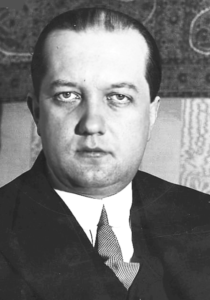
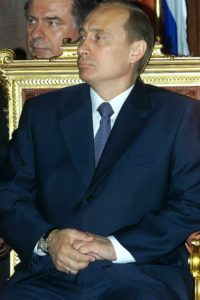
Its leadership at the time, he said, was ‘strongly anti-Semitic’. He also described Poland’s ambassador to Germany until 1939, Jozef Lipski, as “a bastard, an anti-Semitic pig” who had, Putin claimed, promised Hitler a memorial in Warsaw for deporting the Jews. Lipski is not alive to defend himself and certainly there was fairly widespread anti-Semitism across much of Europe at the time, including in Poland, but whatever Lipski’s faults, he can hardly be blamed for World War II and Morawiecki said as much. “President Putin has lied about Poland on numerous occasions,” he said. The Russian ambassador was duly summoned for a dressing down. In his statement, Morawiecki reminded the world that “Stalin’s greatest victim was the Russian people. They deserve the ‘truth’ instead of exchanging perpetrators and victims.” Putin’s views were rebuffed by the United States, too, whose ambassador to Poland, Georgette Mosbacher, Tweeted: “Dear President Putin, Hitler and Stalin colluded to launch World War II. Poland was a victim of this horrible conflict.” Morawiecki argued that Putin had an ulterior motive when he made his comments: he was trying to divert attention away from the sanctions imposed by Washington on the Nord Stream 2 gas pipeline between Russia and Germany, as well as the ban imposed on Russia by the World Anti-Doping Agency (WADA) and the various murders and attempted murders of which he stood accused. Putin certainly has form when it comes to hiding his and his country’s shortcomings behind bluster and lies.
FREEDOM FOR ALL?
Morawiecki is clearly a courageous opponent of Soviet-style Communism and present-day Russia, although not everyone would see it that way, at least not unreservedly. That may not be Morawiecki’s fault. Take Poland’s gay community, for instance. Over a hundred Polish municipalities have passed resolutions to “keep out” what they call “LGBT ideology”. Activist and film-maker Bart Staszewski started publicizing what were increasingly known as “LGBT-free zones”, for which Morawiecki accused him of starting a ‘hoax’ that led people to believe Poland has a human rights problem.
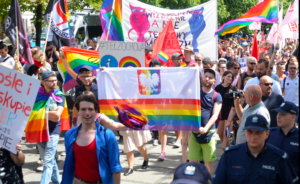
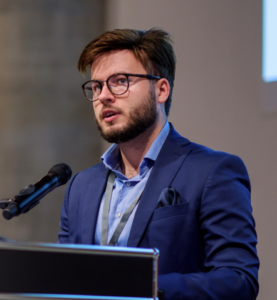
However, to blame Staszewski for creating the term “LGBT-free zone” is at best disingenuous. The term was being used before Staszewski began posting his comments on social media. A pro-government newspaper, Gazeta Polska, even printed stickers with the slogan “LGBT-Free Zone” and a rainbow flag crossed out, for readers to display if they chose to do so. It was what led to the European Parliament passing a resolution denouncing the Polish municipalities involved and to the European Commission suspending aid to them. But Poland’s ruling Law and Justice Party have defended the zones, arguing that they are just trying to protect the country’s ‘Christian traditions’; gay people are not prohibited from living in the areas, it’s argued, although one imagines they would feel fairly unwelcome. In November 2020 the EU finally published a 5-year LGBTIQ Equality Strategy to defend LGBTIQ people from what is seen as an increasing backlash, nowhere more so than in Poland, it seems, where the plan is unlikely to be welcomed. In the past, Polish politicians have said that it is no business of Poland’s neighbours, nor of the EU. Reacting to the new strategy, Evelyne Paradis, Executive Director of ILGA-Europe, an umbrella organisation of Europe-wide LGBTI organisations, said “At the very core of this strategy is the understanding that if you are going to bring about profound change, it needs to be everyone’s business.”
Another controversial issue to beset the Polish government concerns abortion. The almost total ban on the practice has also drawn angry street protests, with some demonstrators arrested and carried off by police. Abortion in Poland is restricted to cases of rape, incest or where the mother’s health is at serious risk. A proposal to permit it in cases of foetal deformity was expressly rejected. Some of those taking part in the protests have been linked to the Women’s Strike movement in Poland, but Morawiecki has urged them to stay home and rehearse their grievances on social media to avoid spreading the corona virus, which sounds sensible, if unlikely to be heeded any more than he would have heeded such instructions during the Communist regime. His words also suggest, though, that he has little sympathy with the protestors anyway. “These outbursts we are seeing in the streets,” he Tweeted, “should absolutely not be taking place. We will oppose any acts of aggression decisively.” When opposition MPs – mostly but not exclusively women – staged a protest in the parliament chamber, PiS leader Jarosław Kaczynski ordered the parliament guards to intervene. Opposition to the government gets short shrift. On the subject of abortion and the new law, Morawiecki said “in order to have the freedom of choice you first must be alive,” which suggests the protesters do not have his support. Interestingly, back in July he urged everyone, especially the elderly, to go out and vote. “I am glad that we are less and less afraid of this virus,” he said then at a PiS election rally. Few of those attending wore face coverings.
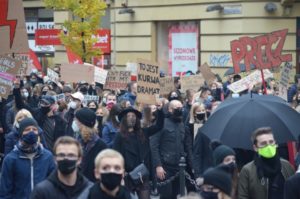
It’s difficult to know how much scope for freedom of decision-making Morawiecki has. On the MDPI (Multi-Disciplinary Digital Publishing Institute) website, Dr. Kyriaki Topidi, Senior Lecturer and Associate Director of the Centre for Comparative Constitutional Law and Religion at the Faculty of Law of the University of Lucerne in Switzerland, writing for the European Centre for Minority Issues (ECMI) in Schiffbrücke, seems to believe that Morawiecki is somewhat constrained. “In the most common representations of the Polish people,” she writes, “the Catholic Church is not simply considered as a part of the Polish nation; it is the Polish nation. This is reflected in the constitutional relationship of the Church and the State, in the form of a concordat. Yet, despite a formally constitutionally warranted separation, the Church retains heavy weight in the legal and political debates to the point that currently, in a time of resurgence of populism across the globe, a number of right-wing parties adopt positions based on those of the Church, establishing a dangerous nexus between religion and nationalism.”
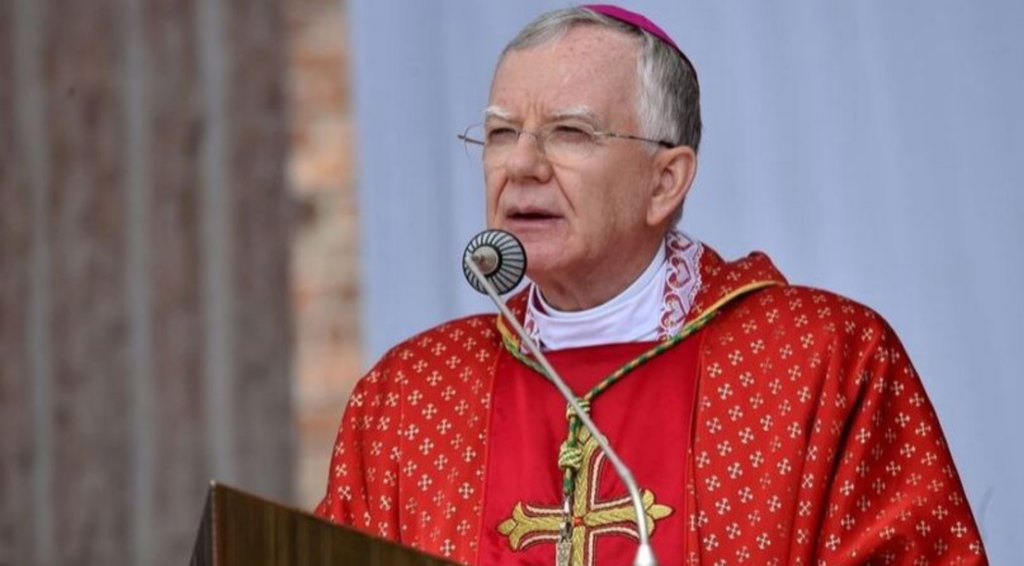
That is almost certainly not a view shared in the Vatican, nor, indeed, in Warsaw’s corridors of power, although some living in America’s so-called ‘Bible Belt’ would presumably understand.
STAYING POPULAR
The whole point of a populist government is to appeal to the ordinary people; in other words, populists must stay popular. It would seem that Morawiecki’s administration is losing its gloss in the eyes of some sections of the public. According to an opinion poll conducted by the CBOS agency in mid-October 2020, support for it has fallen by five percentage points to 33%, while the numbers of its critics grew by nine percentage points to 43%. 49% of those polled said they were not satisfied with the Prime Minister’s performance, which is an increase of eleven percentage points, while the 36% who expressed approval of his administration is 10% lower than in the last such poll. 58% were critical of Poland’s economic policies, which they said would offer them few opportunities for improvement. Meanwhile the country remains at odds with EU institutions. For example, the centre-right European People’s Party (EPP), the largest group within the European Parliament, has urged both Poland and Hungary to accept that future aid will depend upon both countries sticking to EU rules on human rights, democracy and the rule of law. Warsaw and Budapest have both rejected the idea, claiming the plan is ‘neo-colonialism’. However, the EU believes that if a country signs up to ‘join the club’ in order to gain the benefits, they must abide by the club’s rules. After all, if you join, say, a gardening club you could not reasonably defend the right to bring bottles of herbicide to meetings or refuse to let the club committee look at your blooms, even (perhaps especially) if some of them are artificial. Membership is not a one-way affair.
Not all protests in Poland come from the liberal Left. Despite a ban imposed by the mayor of Warsaw on a march through the capital to mark Poland’s Independence Day on 11 November, a great many marchers turned out, many carrying Polish flags and flares. The parade was meant to involve only motor vehicles so as to avoid the risk of spreading the COVID-19 virus, but it was hi-jacked by far-right extremists. An apartment along the route displaying Women’s Strike banners was attacked and set alight with flares. Police were obliged to use force to rein in the more violent marchers with pepper spray and rubber bullets, a move that was strongly defended by Interior Affairs Minister Mariusz Kamiński. Morawiecki finds himself squeezed between those wanting a more liberal type of rule and those who want quite the opposite.
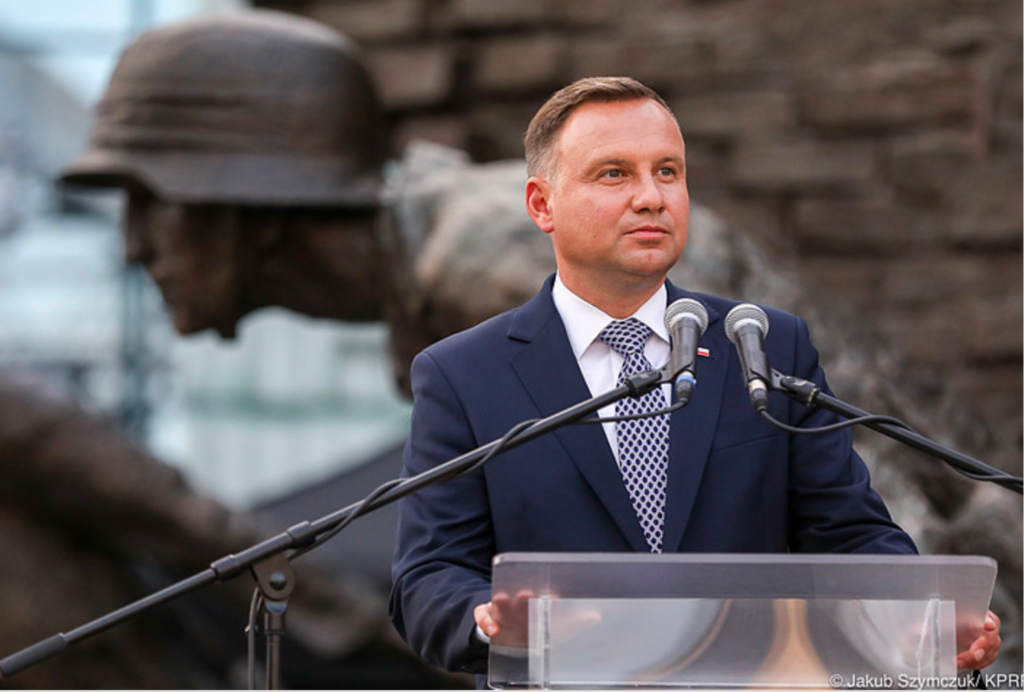
However, PiS has now lost one of its most influential international supporters and admirers: Donald Trump. Trump is the best-known champion of populist regimes. He made Polish President Andrzej Duda very welcome during a visit in June 2020 and the importance of the trip was underlined by Morawiecki. “When asked about Andrzej Duda’s visit to the United States,” wrote the WProst newspaper, “the head of government emphasized the importance of cooperation with the US, especially in the economic sector. It is a visit of huge benefits for Poland. We derive great benefits from our cooperation with the USA in the investments we attract from the USA.” Looking carefully at the choice of words, however, Morawiecki’s remarks don’t read like blind admiration for Trump or for his illiberal beliefs. Whatever some of his more extreme colleagues may say, Morawiecki retains a free mind, it seems; in economic affairs he’s a pragmatist. Hungary’s leader, Viktor Orbán, said earlier this year that “We used to think that Europe was our future; today we know that we are the future of Europe.” He may have spoken prematurely. Morawiecki has yet to voice an opinion on the US election result, although in January 2019 he and Trump were chosen as “politicians of the year” for 2018 and he also visited Trump the following year. Trump’s departure may cause some anxiety in Warsaw, as in Budapest and elsewhere. Speaking before the election, Polish PiS MEP and former Foreign Minister Witold Waszczykowski warned that a Biden win could change the direction of US foreign policy, although he seemed to suggest Biden would be influenced by others. “Looking at both politicians,” Waszczykowski said, “we can see with a naked eye that Biden will not be ruling this country — he will win this election for someone else. The question is for whom. What Washington coterie will govern this? This is an issue because we are dealing with the biggest world power.” He seemed to believe Trump was not influenced by anyone. Meanwhile, President Duda Tweeted: “Congratulations to Joe Biden for a successful presidential campaign. As we await the nomination by the Electoral College, Poland is determined to upkeep high-level and high-quality Poland-US strategic partnership for an even stronger alliance”. He did not mention ‘victory’ and seemed to be waiting to see if Trump’s lawsuits reversed the outcome. Meanwhile, a Warsaw court has ruled that Morawiecki’s decision in April 2020 to get the post office to prepare for a purely postal ballot for the Presidential election was against the law. There have been calls for him to resign.
UNHAPPY MEMORIES
Another area of controversy for Morawiecki concerns allegations of Polish involvement in the Holocaust. Some three million Polish Jews were murdered by the Nazis. Roughly half of the total number of Jews killed by Hitler’s regime were Polish. It was in Poland, 64 kilometres from Kraków, that Germany built its largest death camp, Auschwitz, although there were many others.

It is worth noting that by far the largest group of what are called ‘Righteous Among Nations’ and honoured at the Yad Vashem holocaust memorial were Polish nationals. There are more than 6,000 of them: brave Poles who helped Jewish people to survive at great personal risk. Any Pole caught having helped in any way, even by giving as much as a mouthful of bread, was immediately hanged in public by the Nazis without trial. In Poland, under laws introduced by PiS it is against the law to deny the holocaust, but it is also against the law to suggest that Polish people played any part in it. The law introduced criminal penalties of up to three years imprisonment for what is called “public and contrary-to-fact conduct that attributes responsibility or co-responsibility for the Nazi crimes committed by the Third German Reich to the Polish nation or the Polish state.” Of course, before the Nazi invasion, there was well-documented anti-Semitism in Poland and elsewhere, with members of parliament and the Catholic church calling for Jews to be segregated or deported, although not exterminated. Conditions for Poland’s Jews have been likened to apartheid. In 1941, in the town of Jedwabne, however, more than 340 Jewish men, women and children were murdered, most of them locked in a barn which was then set on fire. The killers, numbering about 40, were non-Jewish Poles, although German military police watched it happen. So yes, there was anti-Semitic violence and murder by, it must be said, a tiny minority of non-Jewish Poles.
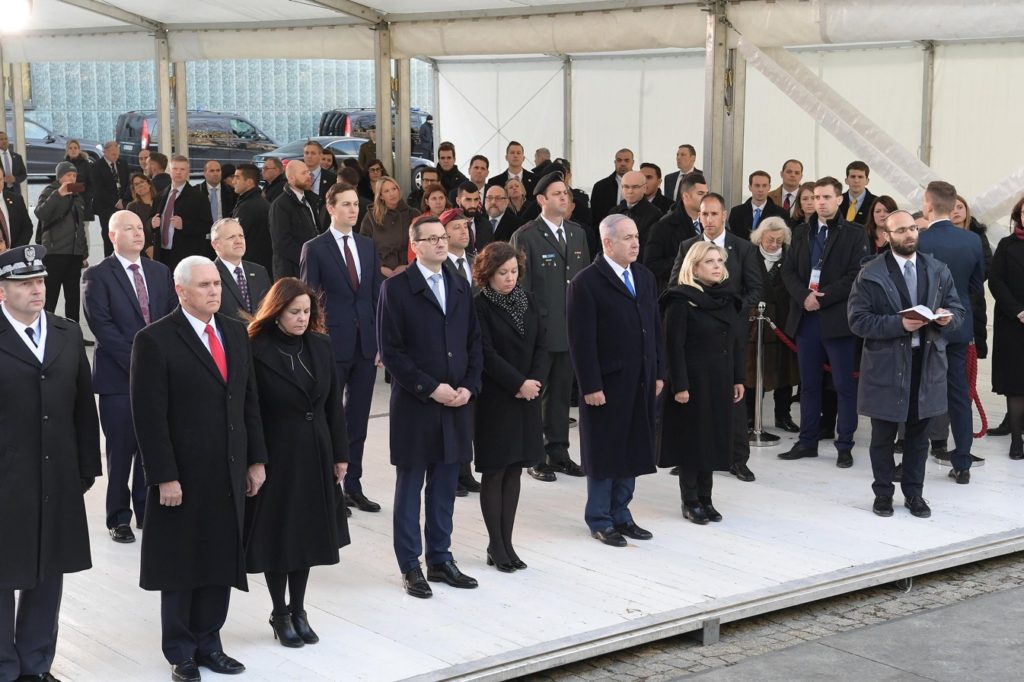
The law against admitting any responsibility led to a letter being published in Britain’s Guardian newspaper, signed by 88 leading Polish and Israeli academics and intellectuals. “This unfortunate bill has made major news in Poland and internationally,” they wrote, “raising logical, moral and legal concerns. Why must a discussion of historical facts involve courts and prosecutors? Why should the victims and witnesses of the Holocaust have to watch what they say for fear of being arrested, and will the testimony of a Jewish survivor who ‘feared Poles’ be a punishable offence?” The tone of the letter is angry but has yet to lead to a change of heart, and it seeks to explain why the bill was passed: “When Poles hear the words ‘Polish camps’, they assume, often overreacting, that they are being accused of being responsible for Auschwitz.” Its writers also accuse the bill’s authors of trying to assume that Poles are completely innocent, with Poland the ‘only guiltless nation in Europe’, writing: “This is not the way to reclaim Poland’s collective dignity.”
Those who support the idea of Poland’s total innocence would do well to remember the Kielce pogrom, when Polish soldiers, police and civilians killed 42 Jews (including a newly born baby and a pregnant woman)and wounded another 40 at Kielce. It followed the brief disappearance of an 8-year-old Polish boy, Henryk Błaszczyk, who claimed to have been kidnapped and held in the basement of the Jewish Centre. Encouraged by his father, he repeated his claim at the police station, following which a patrol of police and soldiers was sent to the house (which, incidentally, had no cellar) and started shooting, also dragging people out into the courtyard where they were stoned, stabbed and robbed by locals. It went on all day and it was not until 1988 that the supposed kidnap victim admitted that he was never kidnapped, but his father had sworn him to secrecy.
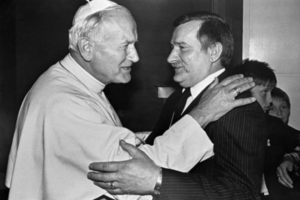
This disgraceful incident occurred in July 1946, long after the Nazis had gone, so no-one can blame the Germans for it. The incident led many of Poland’s surviving Jews to emigrate to Palestine and is commemorated by a plaque, dedicated in 1990 by Lech Wałęsa, then leader of Solidarność. It’s not something Polish people want to talk about but making it illegal to suggest that any Poles played a part in the Holocaust has proved controversial.
“The amendment of the Act on the Institute of National Remembrance is not meant to censor the sad part of our common history,” Morawiecki assured Israeli journalists. He told them that the new provisions of the Act on the Institute of National Remembrance, as it’s called, were intended to counteract false information on the Holocaust, coming in reaction to various books and articles referring to ‘Polish death camps’. They were not Polish and Poles were not allowed anywhere near them on pain of death (unless they had been sent there by the Nazis for internment or execution); they were designed, built and operated by the Germans and their allies. They just happened to be in Poland. Morawiecki reminded the Israelis that Poland had only regained its independence in 1989, while after the World War II, “the communistic elites that ruled over our country at the time did not care for Poland’s reputation and did not wish to investigate complex issues of our history,” he said. “Poland and Israel had reached a very important point in their common history.” Morawiecki said that he understood Israel’s criticism of the changes but pointed out that Poland had been the first victim of the Nazis and during the war had lost six million citizens,
including three million Jews.
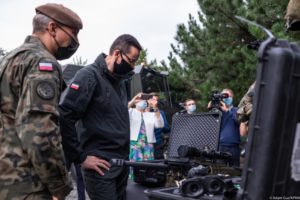
Given the terrible circumstances it’s not really surprising that Poles tend to be touchy about the war, something of which Morawiecki is only too well aware. Poland’s wishes were ignored in 1939 by the invading armies of Nazi Germany and Soviet Russia and when the war ended, they were ruled by a largely unsympathetic Communist regime. Despite post-war international agreements, the Soviet Union seized various Polish assets, including the contents of a tractor factory near Poznań, a metal-working factory near Bydgoszcz and a printing press in Toruń. They justified it by claiming it was ‘German property’, even though the sites had earlier been seized by the Nazis from Poles, some of them Jewish. According to the American-Polish writer and historian Anne Applebaum (one of the signatories to that letter to the Guardian) in her book ‘Iron Curtain’, “Stalin ordered a special committee to investigate and create an inventory of the property ‘gained’ in the war, with the aim of carrying it off to the Soviet Union.” Poland, unsurprisingly, lost out again. Morawiecki is determined his country will not suffer further losses, although clinging to a very conservative agenda, especially with Joe Biden in the White House, may mean losing international prestige as well as sympathy and political support.

